- Home
- Mitch Albom
The Magic Strings of Frankie Presto
The Magic Strings of Frankie Presto Read online
Dedication
To my uncle Mike, the first of many
musicians in my life who made me say,
“I want to play like that.”
Epigraph
Here’s to all the boys who came along
Carrying soft guitars in cardboard cases
All night long
And do you wonder where those boys have gone?
—PAUL SIMON
Contents
Dedication
Epigraph
Part 1
Chapter 1
Marcus Belgrave
Chapter 2
Chapter 3
Clem Dundridge
Chapter 4
Chapter 5
Darlene Love
Chapter 6
Chapter 7
Chapter 8
Leonard “Tappy” Fishman
Chapter 9
Chapter 10
Chapter 11
Chapter 12
Chapter 13
Abby Cruz
Chapter 14
Chapter 15
Chapter 16
Part 2
Niles Stango
Chapter 17
Chapter 18
Chapter 19
Chapter 20
Chapter 21
Chapter 22
Chapter 23
Chapter 24
Burt Bacharach
Chapter 25
Chapter 26
Chapter 27
Chapter 28
Chapter 29
Chapter 30
Chapter 31
Chapter 32
Part 3
Cecile (York) Peterson
Chapter 33
Chapter 34
Chapter 35
Chapter 36
Chapter 37
Chapter 38
Chapter 39
Chapter 40
Roger McGuinn
Chapter 41
Chapter 42
Chapter 43
Part 4
Pau Sanz
Chapter 44
Chapter 45
Chapter 46
Chapter 47
Tony Bennett
Chapter 48
Chapter 49
Chapter 50
Chapter 51
Part 5
Paul Stanley
Chapter 52
Chapter 53
Part 6
Chapter 54
Wynton Marsalis
Chapter 55
Chapter 56
Ingrid Michaelson
Chapter 57
Chapter 58
Chapter 59
Chapter 60
John Pizzarelli
Chapter 61
Chapter 62
Chapter 63
Acknowledgments
About the Author
Also by Mitch Albom
Credits
Copyright
About the Publisher
1
I HAVE COME TO CLAIM MY PRIZE.
He is there, inside the coffin. In truth, he is mine already. But a good musician holds respectfully until the final notes are played. This man’s melody is finished, but his mourners have come a great distance to add a few stanzas. A coda, of sorts.
Let us listen.
Heaven can wait.
Do I frighten you? I shouldn’t. I am not death. A grim reaper in a hood, reeking of decay? As your young people say—please.
Nor am I the Great Judge whom you all fear at the end. Who am I to judge a life? I have been with the bad and the good. I hold no verdict on the wrongs this man committed. Nor do I measure his virtues.
I do know a great deal about him: the spells he wove with his guitar, the crowds he enthralled with that deep, breathy voice.
The lives he changed with his six blue strings.
I could share all this.
Or I could rest.
I always make time to rest.
Do you think me coy? I am at times. I am also sweet and calming and dissonant and angry and difficult and simple, as soothing as poured sand, as piercing as a pinprick.
I am Music. And I am here for the soul of Frankie Presto. Not all of it. Just the rather large part he took from me when he came into this world. However well used, I am a loan, not a possession. You give me back upon departure.
I will gather up Frankie’s talent to spread on newborn souls. And I will do the same with yours one day. There is a reason you glance up when you first hear a melody, or tap your foot to the sound of a drum.
All humans are musical.
Why else would the Lord give you a beating heart?
Of course, some of you get more of me than others. Bach, Mozart, Jobim, Louis Armstrong, Eric Clapton, Philip Glass, Prince—to name but a few of your time. In each of their cases, I felt their tiny hands at birth, reaching out, grabbing me. I will share a secret: this is how talents are bestowed. Before newborns open their eyes, we circle them, appearing as brilliant colors, and when they clench their tiny hands for the first time, they are actually grabbing the colors they find most appealing. Those talents are with them for life. The lucky ones (well, in my opinion, the lucky ones) choose me. Music. From that point on, I live inside your every hum and whistle, every pluck of a string or plink of a piano key.
I cannot keep you alive. I lack such power.
But I infuse you.
And yes, I infused the man in the coffin, my mysterious and misunderstood Frankie Presto, whose recent death during a festival concert was witnessed by a sold-out crowd, his body lifting to the rafters before dropping to the stage, a lifeless shell.
It caused quite a stir. Even today, as they gather in this centuries-old basilica for his funeral, people are asking, “Who killed Frankie Presto?” because no one, they say, dies that way on his own.
That is true.
Did you know his first name was actually Francisco? His managers tried to hide that. “Frankie,” they believed, was more palatable to American fans. The way young girls would scream it at his concerts—“Frankie! I love you, Frankie!”—I suppose they were right. Shorter names are more suited to hysteria. But you cannot change your past, no matter how you craft your future.
Francisco was his real name.
Francisco de Asís Pascual Presto.
I rather like it.
I was there the night it was bestowed.
That’s right. I know the unknown details of Frankie Presto’s birth, the ones historians and music critics—even Frankie himself—always labeled a mystery.
I can share them if you like.
Does that surprise you? My willingness to begin with such a coveted story? Well. Why delay? I am not one of the “slower” talents, like Reason or Mathematics. I am Music. If I bless you singing, you can do so from your first attempt. Composing? My best phrases often lie in the opening notes. Mozart’s Eine kleine Nachtmusik? Dum, da-dum, da-dum da-dum da-dum? He burst out laughing when he played that on his fortepiano. It took less than a minute.
You want to know how Frankie Presto came into this world?
I will tell you.
Simple as that.
It happened here, in Villareal, Spain, a city near the sea that was founded by a king more than seven centuries ago. I prefer to begin everything with a time signature, so let us set this as August 1936, in an erratic 6/5 tempo, for it was a bloody period in the country’s history. A civil war. Something whispered as El Terror Rojo—the Red Terror—was coming to these streets and, more specifically, to this church. Most of the priests and nuns had already fled t
o the countryside.
I recall that evening well. (Yes, I have memory. No limbs, but endless memory.) There was thunder in the skies and rain pounding on the pavement. A young expectant mother hurried in to pray for the child she carried. Her name was Carmencita. She was thinly framed with high cheekbones and thick, wavy hair the color of dark grapes. She lit two candles, made the sign of the cross, put her hands on her swollen belly, then doubled over in pain. Her labor had begun.
She cried out. A young nun, with hazel eyes and a small gap between her teeth, rushed to lift her up. “Tranquila,” she said, cupping Carmencita’s face. But before the women could make for the hospital, the front doors were smashed in.
The raiders had arrived.
They were revolutionaries and militiamen, angry at the new government. They had come to destroy the church, as they had been doing all over Spain. Statues and altars were desecrated, sanctuaries burned to a char, priests and nuns murdered in their own sacred spaces.
You would think when such horror occurs, new life would hold in frozen shock. It does not. Neither joy nor terror will delay a birth. The future Frankie Presto had no knowledge of the war outside his mother’s womb. He was ready for his entrance.
And so was I.
The young nun hurried Carmencita to a hidden chamber, up secret steps built centuries earlier. As the raiders destroyed the church below, she laid Frankie’s mother on a gray blanket in a corner lit by candles. Both women were breathing quickly, creating a rhythm, in and out.
“Tranquila, tranquila,” the nun kept whispering.
The rain rapped the roof like mallets. The thunder was a tympani drum. Downstairs the raiders set fire to the refectory and the flames crackled like a hundred castanets. Those few who had not fled the church were screaming, high, pleading shrieks, met by lower barking orders of those committing the atrocities. The low and high voices, the crackling fire, whipping wind, drumming rain and crashing thunder created an angry symphony, swirling to a crescendo, and just as the invaders threw open the tomb of Saint Pascual, ready to desecrate his bones, the bells above the basilica began to chime, causing all to look up.
At that precise moment, Frankie Presto was born.
His tiny hands clenched.
And he took his piece of me.
Ah-ah-ah. Am I committing to this tale? I must consider the composition. It is one thing to tell the story of a birth, quite another to tell the whole life.
Let us leave the coffin and go outside for a moment, where the morning sun is causing people to squint as they emerge from their cars, parked along the narrow streets. Only a few have arrived so far. There should be many more. By my measure (which is always accurate) Frankie Presto, during his time on earth, played with three hundred and seventy-four bands.
You would think that means a large funeral.
But everyone joins a band in this life. Only some of them play music. Frankie, my precious disciple, was more than a guitarist, more than a singer, more than a famous artist who disappeared for a good chunk of his life. As a child, he suffered greatly, and for his suffering, he was granted a gift. A set of strings that empowered him to change lives.
Six strings.
Six lives.
It is why, I suspect, this farewell could prove interesting. And why I will stay to hear the mourners speak—Frankie’s remarkable symphony, as played by those who knew him. There is also the matter of his strange death, and the shadowy figure who was following him just before it.
I want to see this resolved.
Music craves resolution.
But for the moment, I should rest. So many notes already shared. Do you see those men on the church steps, smoking cigarettes? The one in the tweed bowler cap? He is also a musician. A trumpeter. He had nimble fingers once, but he is old now and battles illness.
Listen to him for a moment.
Everyone joins a band in this life.
Frankie was once in his.
Marcus Belgrave
Jazz trumpeter, Marcus Belgrave and His Quintet; the Ray Charles band; sideman with McCoy Tyner, Dizzy Gillespie, Ella Fitzgerald, and others
LEMME HAVE A LIGHT. . . . MMM . . . MMM . . . THANKS. . . .
No, uh-uh, I can’t believe it neither. Nobody dies like that. But I’m telling you, Frankie had some strange stuff going on, magic, voodoo, something . . . I never told no one this story, but I swear it’s true.
We were playing a club up in Detroit, maybe 1951 or ’52, in the part they called Black Bottom. Used to be a nice buncha clubs there, but after the war, it got pretty dicey.
Anyhow, we’re playing a Friday night, four sets—eight, ten, midnight, and two a.m.—and Frankie’s with us, just this skinny teenager playing the guitar. This was way before he made them hit records or even started singing. Shoot, I didn’t even know his last name. Just “Frankie.” He wasn’t supposed to be there on account of how young he was, but he never asked for no money, and to the guy who owned the club, that made him twenty-one, know what I mean? We let him sit in the back, out of the spotlight, his big mop of black hair bouncing in the shadows. At the end of the night, he got a free plate of chicken, and we got us a free guitar player.
I know, I know, I’m getting to it. Like I said, the place was low-end now, some bad elements, and at one point we were playing “Smokehouse Blues,” and a big bearded fella is sitting in the corner with this pretty young blond thing who’s wearing too much lipstick, maybe trying to look older.
Well, something musta happened, because the Beard jumps up and pushes the girl against the wall, his chair goes flying backward, and he’s got a knife to her throat. He’s choking her, screaming, calling her every kind of name. Tilly, our piano player, walks straight out the door, because that was how he was—“Don’t-Want-No-Trouble Tilly,” we used to call him—but the rest of us were riffing on the chords with that frozen kind of look when you don’t wanna watch, but you can’t turn away? It was almost like if we stopped playing, the Beard was gonna kill this girl. He’s screaming, waving that knife, she’s choking, and nobody was doing nothing, because this guy was big.
Well, next thing I know, Frankie jumps up front and starts playing real loud, and fast. He’s playing so good, people kinda don’t know where to look. And Frankie yells, “Hey!” and the Beard looks over and hollers something drunk. But Frankie just plays faster. Me, Tony, and Elroy, we’re trying to keep up but he’s off into something, fingers moving like they’re possessed.
“Hey!” Frankie yells again, and he’s playing like lightning, still getting every note clear and true. And damn if the guy doesn’t turn and point the knife at him now like he’s taking the challenge.
“Faster,” the Beard grumbles.
So Frankie goes faster. Some people start whooping, like it’s a game. And now Frankie’s off “Smokehouse” and he’s on to “Flight of the Bumblebee,” you know, from that Russian opera? I’m trying to find the notes on my horn, and Elroy is banging the pedal so hard his damn foot is gonna snap off.
And again, the guy yells, “Faster!”
And we’re thinking there’s no way on the Lord’s earth anyone can play faster than—but before we even finish that thought, Frankie’s upped it again, his fingers running from the bottom strings to the top strings so fast I swear a buncha bumblebees is gonna come flying out of that guitar. He’s not even looking at his hands. He’s just staring at the guy, with his lips kinda open, hair falling onto his forehead, and everyone is clapping now, trying to keep pace with Elroy’s beat, and Frankie starts this run from the far end of the neck up to the highest frets and the Beard is damn near hypnotized and he comes closer for a better look. Frankie’s staring at the lipstick girl and she’s staring at him, and then he jerks his head and she’s outta there, quick as a bullet.
And now the whole place is whooping in that way crowds do—you know, “Whoo! Who
o! Whoo! Whoo!”—and the kid squeezes his lips and he’s up in the highest notes, sounds like he’s pinching baby birds it’s so damn high, and the Beard is by the edge of the stage and Frankie points the neck right at him like some kinda machine gun—bangadedybangedybang—and then he’s done. Finished. And he whips the guitar over his head and the whole place is going crazy, just breathing hard, like, man, that boy can play and we’re glad nobody’s dead.
And then Frankie races out the door, chasing that girl.
But here’s the thing.
I look at his guitar, and one of the strings has turned blue. I swear. Blue as the middle of a flame.
I thought to myself, I don’t know where this kid come from. Maybe I don’t want to know.
2
WELL.

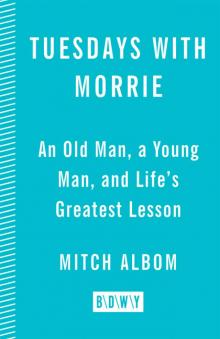 Tuesdays With Morrie
Tuesdays With Morrie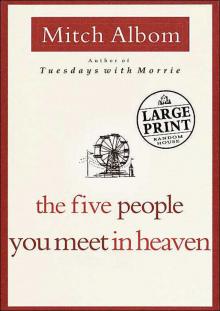 The Five People You Meet in Heaven
The Five People You Meet in Heaven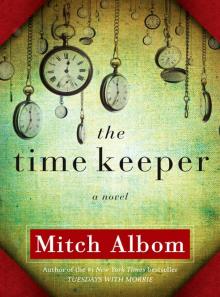 The Time Keeper
The Time Keeper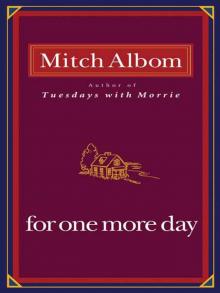 For One More Day
For One More Day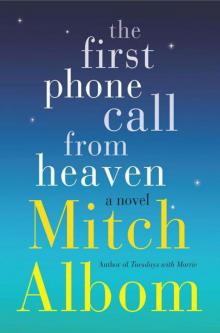 The First Phone Call From Heaven: A Novel
The First Phone Call From Heaven: A Novel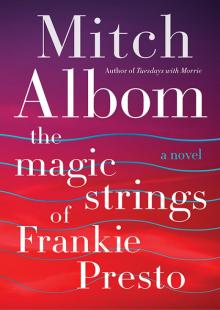 The Magic Strings of Frankie Presto
The Magic Strings of Frankie Presto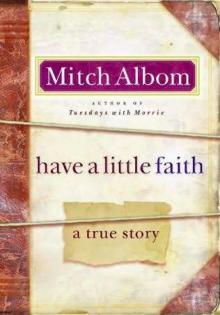 Have a Little Faith: A True Story
Have a Little Faith: A True Story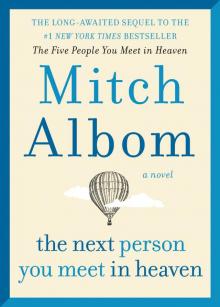 The Next Person You Meet in Heaven
The Next Person You Meet in Heaven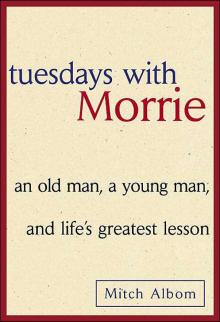 Tuesdays with Morrie: an old man, a young man, and life’s greatest lesson
Tuesdays with Morrie: an old man, a young man, and life’s greatest lesson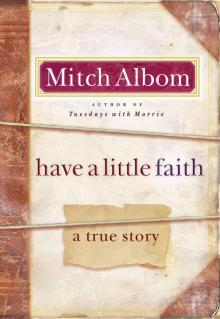 Have a Little Faith
Have a Little Faith